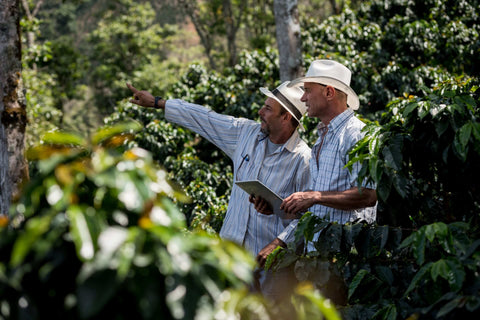You have a global network of local teams in Seattle, New York, Antwerp, Hong Kong, Sydney, Auckland and Beirut. How do you keep your widespread team linked up and on the same page?
Being technology-forward, innovative, and highly adaptable is crucial in any successful business, and it’s definitely provided some benefits this year. For instance, our commitment to using technology to facilitate communication and our global/local team approach very much prepared us to adapt to the new circumstances presented by COVID-19 in a relatively painless way.
Our company, as well, has a very clear vision and purpose that is shared by every single employee, to be the ‘leading sustainable Farm to Roaster coffee company in the world’. These words guide us and it’s a goal that all of us are driven toward. Though constantly emphasizing company values and so on can sometimes come across as just ‘marketing fluff’, at Sucafina, I think we have something pretty special: shared values and purpose and a deep belief in what we are doing together as a company. As individuals we all share the same commitment to sustainability through caring for people, the environment, and the well-being of the farmers we work with.

We do a lot of cross-team and cross-location work to make our goals a reality. Sometimes, this requires some sacrifices—such as sleep! Trying to find a way to get Seattle to meet up with Sydney or Papua New Guinea is tricky. Someone’s going to have to be working at odd hours. But the team is willing to do it because of our higher shared purpose. And because we know it pays off for everyone in the long-run.
As individuals we all share the same commitment to sustainability through caring for people, the environment, and the well-being of the farmers we work with.
We also genuinely like each other and like to talk to one another and share experiences. We try and launch annual internal, fun projects that go beyond just working. For instance, we ran a company-wide, virtual global 5km for Girls Gotta Run this year, which was great as we got running photos from team members from all around the world and also raised funds for girls’ education. We ‘hang out’ online where we can and just enjoy a good chat. I think that ‘global’ corporations are often perceived as alienating and monolithic. Nothing could be further from the truth with Sucafina. It’s really more like a vibrant global community of 1,000+ people who share the same mind-set.

When you have this—combined with good leadership—it makes it easier to communicate and problem solve. And we really are one team, linked up globally and horizontally; we are working together to build something pretty unique – the first truly integrated global specialty coffee supply chain in the world.
What are some ways you ensure that your partners at origin are sharing in the success of their coffees?
There are actually many that we could reference. We launched our Farmer Hub Initiative in 2018 and is set up to fund alternative projects on agency banking, alternative crop production such as grains and bananas, as well as circular economy models for supplying goods and services to farmers living in proximity to our supply chain in East Africa. We also work with a company called Farmer Connect, which we talk about in more detail below. Our goal is to have initiatives in all of the major countries where we work, which in turn is working towards our vision of truly ‘shared value’. It varies from country to country, but the end goal is to link farmers and roasters more equitably and sustainably in all of our transactions.
'From digital farmer identities with blockchain-enabled ledgers, to farm-level agronomy improvements and supply chain digitalization, we’re on the edge of innovation that enhances returns for producers and roasters alike.'
To this end, we do a great deal of direct-trade facilitation, we provide price transparency (both to customers and to farmers) wherever possible, and we prioritize work that ensures higher-quality and more-efficient production for farmers. Many of our initiatives also have beneficial long-term outcomes. For instance, our Soil Sampling project in Kenya not only helps farmers more efficiently apply farming inputs, thus improving productivity, but it also creates jobs for young people. Our Akacu shops in Burundi enable communities to purchase household necessities and food at lower costs while also presenting entrepreneurship opportunities for community members. We also invest, with the help of our roaster–clients, in farmer and community well-being through projects like Buy-1-get-1-tree (run in partnership with Rikolto and the Koerintji Barokah Bersama cooperative), which helps farmers in Indonesia establish shade trees on their coffee farms while also generating additional income. Our farm/community-level investment activities are growing every day, with new initiatives being developed as we speak.

Tell us more about the blockchain-enabled ledgers and supply chain digitalization you’re introducing at Sucafina.
We were initially supporters of and continued working with a start-up company named Farmer Connect. The goal of the company is to humanize consumption through data. Similar to our own supply chain, this all starts with farmers.
In the past, most smallholders didn’t have the ability to digitally capture information about their farms. However, now with the increasing availability of mobile technology, we are able to truly empower farmers to own, control, and monetize their data.

We are currently working on pilot projects in Rwanda, Brazil, Colombia, and Vietnam where farmers are given a Farmer ID, which acts like a digital wallet. When they sell coffee to Sucafina, we can issue them a digital credential, that is like a form of a contract, indicating the quantity, price, and quality of the coffee being sold. Once the farmer confirms, two nice things happen. First, the farmer has a digital record of production and income that has been verified by Sucafina that we believe will make them bankable. Second, Sucafina now has traceable coffee with farmer confirmed prices. So if someone asks how can they know that farmers have received a fair price, we have proof from the farmers themselves.
Farmers additionally are able to receive other types of digital credentials from third parties that verify social and environmental work being done on the farm. This helps differentiate farmers and should allow the most responsible farmers achieve higher prices for their coffee or become applicants of micro finance lending. It is all about building a system of trust!
'Now with the increasing availability of mobile technology, we are able to truly empower farmers to own, control, and monetize their data.'
For Sucafina, the traceability data today just shows the journey of the coffee as it travels through the wet mill, dry mill, ports of export and then later import and ultimately to our client. However, in the future, we believe that the Farmer Connect tool will also be used for carbon mapping and deforestation tracking, along with many other cool use-cases.
Farmer Connect is also just one of many start-ups and external organizations Sucafina is working with today. We firmly believe that the coffee industry will become fully digitalized during this decade, and our role as coffee merchants will evolve into not only selling coffee but also utilizing data to improve the supply chain in the future.
This article is proudly published in partnership with Sucafina.



